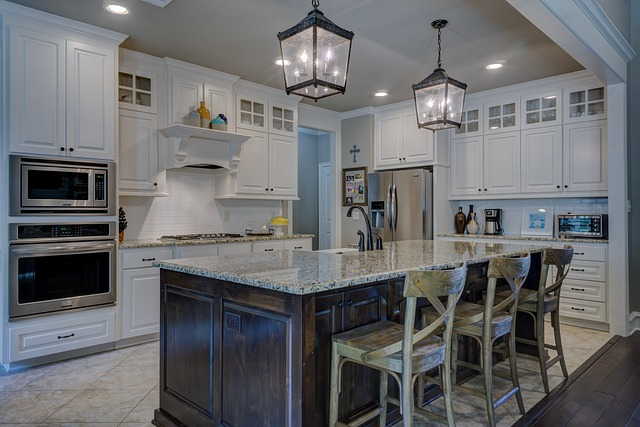Crafting the Perfect Creative Real Estate Listing Descriptions
In today’s competitive real estate market, capturing the attention of potential buyers is more crucial than ever. Crafting the perfect creative real estate listing descriptions can make all the difference in standing out from the competition and ultimately selling a property. This blog post will guide you through the process of creating captivating and engaging real estate property descriptions that resonate with potential buyers, showcasing the property’s unique features and benefits, and ensuring compliance with fair housing laws. By the end, you’ll be well-equipped to create real estate listing descriptions that turn heads and help close deals.
Key Takeaways
Master the art of creating motivating real estate listing descriptions to capture potential buyers’ attention.
Understand your target audience and incorporate storytelling techniques into your property listing description for an emotional connection.
Use powerful words, avoid clichés and promote inclusivity/diversity to craft effective headlines and opening statements that motivate action!
Mastering the Art of Real Estate Listing Descriptions

Every real estate agent should strive to master the skill of creating an engaging and compelling real estate listing description. A well-written property description can capture the attention of potential buyers. It can paint a vivid picture of the property, persuading them to take the next step in the buying process. Crafting an effective real estate advertisement is an essential part of this process. Real estate agents play a crucial role in achieving this goal.
Understanding your target audience and weaving in storytelling techniques can lead to impactful and creative real estate listing descriptions that not only leave a lasting impression, but also heighten the likelihood of property sales.
Understand Your Target Audience

Tailoring your listing descriptions to resonate with potential buyers requires an understanding of their preferences, needs, and concerns. It is important to address their primary concerns, such as:
location
size
amenities
price
By addressing these concerns, you can pique their interest and make them feel like the property is a perfect fit.
For example, mentioning the presence of a home office, a great school district, or outdoor living spaces can maximize interest from prospective buyers. By understanding your audience, you can create listing descriptions that truly speak to their hearts and drive them to take action.
Incorporate Storytelling Techniques
Incorporating storytelling techniques into your listing descriptions can be a potent tool. This can evoke emotions and create mental images, immersing potential buyers in the property’s narrative and elevating its memorability and appeal.
For example, instead of simply listing the features of a property, paint a picture of what life could be like for the potential buyer living in that home. Using this approach, you’ll create a lasting impression that inspires buyers to:
Envision themselves in the property
Imagine the lifestyle they could have
Feel emotionally connected to the home
Take action and make an offer
By appealing to their emotions and helping them visualize their future in the property, a real estate agent can increase the likelihood of a successful sale.
Creative Real Estate Listing Description Examples

Having understood the importance of engaging listing descriptions and the techniques to craft them, let’s explore a few creative real estate listing descriptions examples that highlight various property features. Each example focuses on a particular aspect of the property, such as luxury and modern design or outdoor living spaces, to give you a better idea of how to create compelling property descriptions that highlight the unique selling points of your next property listing.
By focusing on the features that make your property stand out, you can create descriptions that will draw attention to your property.
Example 1: Emphasizing Luxury and Modern Design

Welcome to this stunning architectural masterpiece, where cutting-edge design meets unparalleled luxury. Step inside the grand foyer and be greeted by soaring ceilings, sleek polished concrete floors, and floor-to-ceiling windows that flood the open-concept living space with natural light.
The state-of-the-art chef’s kitchen features top-of-the-line stainless steel appliances, custom cabinetry, and a waterfall-edge quartz island, perfect for entertaining.
Retreat to the spacious master bedroom, boasting a spa-like ensuite and a custom walk-in closet that fashionistas dream of. The attention to detail and exquisite finishes throughout this property are truly unparalleled, making it the epitome of modern elegance.
Example 2: Showcasing Outdoor Living Spaces

Nestled in a prestigious neighborhood, this charming family home offers the perfect blend of indoor and outdoor living spaces. As you enter the home, you’ll be captivated by the spacious living room featuring floor-to-ceiling windows that open to a beautiful covered patio, seamlessly integrating indoor and outdoor living.
The gourmet kitchen is perfect for the home chef, complete with top-of-the-line appliances and a cozy breakfast nook overlooking the lush backyard.
Step outside and discover the ultimate outdoor oasis, featuring a sparkling pool, built-in BBQ, and a cozy fire pit area, perfect for entertaining friends and family or simply enjoying a relaxing evening under the stars.
Tips for Writing Attention-Grabbing Headlines

Potential buyers first encounter the headline before they delve into your listing description. A captivating headline, therefore, plays a critical role in drawing their attention and stimulating their curiosity to learn more about the property. Therefore, it’s essential to craft a compelling opening statement that highlights the property’s unique features and benefits.
In the following subsections, we’ll provide tips on how to create attention-grabbing headlines that will make your real estate listings stand out from the competition.
Be Specific and Descriptive
When crafting headlines for your real estate listings, it’s essential to be specific and descriptive. This will effectively convey the property’s unique features and benefits. Avoid using generic phrases or clichés that won’t add value to your headline.
Instead, focus on using powerful descriptive words that evoke emotions and paint a vivid picture of the property. Words such as “stunning,” “luxurious,” or “breathtaking” are very effective. This approach will not only draw the attention of potential buyers, but also create a sense of anticipation and excitement about the property.
Keep It Short and Sweet
While it’s essential to be specific and descriptive in your headlines, it’s also crucial to keep them short and sweet. Long headlines can be overwhelming and may deter potential buyers from reading the rest of your listing description. Aim for headlines that are concise yet impactful, using just a few powerful words to convey the main message.
Remember, the goal is to capture the reader’s attention quickly and encourage them to explore the property further. By keeping your headlines short and sweet, you’ll increase the chances of potential buyers taking the time to read the entire listing description.
Crafting Engaging Opening Statements

Capturing potential buyers’ attention and sparking their curiosity about the property hinges on an engaging opening statement. By addressing the buyer’s main concerns and showcasing the property’s unique selling points, you can create a compelling opening statement that will make potential buyers eager to discover more about the property.
In the following subsections, we’ll discuss how real estate agents can answer the buyer’s main concerns and showcase the property’s unique selling points in an opening statement.
Answer the Buyer’s Main Concerns
When crafting your opening statement, it’s essential to address potential buyers’ primary concerns, such as location, size, and amenities. By providing specific details about these aspects, you can reassure potential buyers that the property meets their needs and expectations. For example, mention the property’s proximity to public transportation, schools, and shopping centers. Highlight the spacious living areas and modern amenities.
By addressing the buyer’s main concerns in your opening statement, you’ll create a sense of trust and credibility. This makes it more likely for potential buyers to continue reading and consider the property.
Showcase the Property’s Unique Selling Points
In addition to addressing potential buyers’ main concerns, it’s crucial to showcase the property’s unique selling points in your opening statement. Highlighting these features will set your property apart from the competition and create a lasting impression on potential buyers.
For example, you could emphasize the property’s stunning views, luxurious amenities, or recent renovations. By showcasing the property’s unique selling points in your opening statement, you’ll pique potential buyers’ interest and make them eager to learn more about the property.
Selecting the Right Adjectives and Phrases

Creating a vivid and appealing listing description necessitates choosing the right adjectives and phrases. Powerful descriptive words can evoke emotions and create a strong impression of the property, making it more attractive to potential buyers.
In this section, we’ll discuss how to use powerful descriptive words and avoid overused and clichéd terms, ensuring your listing descriptions are engaging and compelling.
Use Powerful Descriptive Words
Using powerful descriptive words in your listing descriptions can create a lasting impression on potential buyers, evoking emotions and painting a vivid picture of the property. For example, words like “captivating,” “pristine,” or “serene” can help your property stand out and create a sense of anticipation and excitement.
Be strategic in your choice of words. Select those that effectively convey the property’s unique features and benefits, and avoid overusing any particular adjective or phrase. By using powerful descriptive words, you’ll create engaging and compelling listing descriptions that resonate with potential buyers.
Avoid Overused and Clichéd Terms
While it’s essential to use descriptive words in your listing descriptions, it’s equally important to avoid overused and clichéd terms. These may detract from the property’s appeal and make the listing description feel generic. Words like “cozy,” “charming,” or “move-in ready” have been used so often in real estate listings that they’ve lost their impact and may not resonate with potential buyers.
Instead, focus on using fresh, impactful language that accurately conveys the property’s unique features and benefits. By avoiding overused and clichéd terms, you’ll ensure your listing descriptions remain engaging and appealing to potential buyers.
Ensuring Compliance with Fair Housing Laws

Crafting your listing descriptions as a real estate agent requires ensuring compliance with Fair Housing Laws. These laws protect people from discrimination in housing based on:
race
color
religion
national origin
gender
disability
family status
In the following subsections, we’ll discuss how real estate agents can be mindful of protected classes and promote inclusivity and diversity in listing descriptions to ensure compliance with these laws.
Be Mindful of Protected Classes
In your real estate property descriptions, it’s essential to avoid mentioning protected classes, such as race, gender, and religion, to prevent discrimination. Instead, focus on using neutral and inclusive language that appeals to a wide range of potential buyers.
By being mindful of protected classes in your property listing, you’ll not only ensure compliance with Fair Housing Laws, but also create a more inclusive and diverse environment for all potential buyers.
Promote Inclusivity and Diversity
Using inclusive language and promoting diversity in your listing descriptions can help appeal to a broader range of potential buyers. This ensures compliance with Fair Housing Laws. Be mindful of the language you use to describe the property’s features and benefits, ensuring that it’s welcoming and open to all potential buyers.
By promoting inclusivity and diversity in your listing descriptions, you’ll create a more appealing and accessible environment for all potential buyers, increasing the chances of selling the property.
Editing and Proofreading Your Listing Description

After crafting your listing description, you must devote time to edit and proofread it, ensuring it’s polished and error-free. This crucial step not only helps to eliminate any mistakes or inconsistencies, but also enhances the overall quality and readability of your listing descriptions.
In the following subsections, we’ll discuss how to review and revise your content. Enlist the help of a colleague or professional editor to ensure your listing description is engaging and compelling.
Review and Revise Content
Reviewing and revising your content is an essential part of creating an error-free and polished listing description. Read through your content carefully to identify and correct any errors, inconsistencies, or unclear language.
Additionally, ensure that your content is structured logically and flows well, providing a clear and engaging experience for the reader. By taking the time to review and revise your content, you’ll ensure that your listing descriptions are accurate, clear, and captivating to potential buyers.
Grammarly can be a great tool for ensuring that your content is error free!
Enlist a Colleague or Professional Editor
Sometimes, a fresh pair of eyes can spot errors or inconsistencies that you might have missed during your review process. Enlisting the help of a colleague or professional editor can ensure that your listing description is engaging and compelling. They can provide valuable feedback and suggestions, helping you refine your content and elevate its quality.
By enlisting the help of a colleague or professional editor, you’ll ensure that your listing descriptions are of the highest caliber, making them more appealing to potential buyers.
Summary
In conclusion, crafting the perfect creative real estate listing description involves understanding your target audience, using storytelling techniques, writing attention-grabbing headlines, crafting engaging opening statements, selecting the right adjectives and phrases, and ensuring compliance with Fair Housing Laws. By following the tips and techniques discussed in this blog post, you’ll be well-equipped to create captivating and compelling listing descriptions that resonate with potential buyers, showcase the property’s unique features and benefits, and ultimately help you sell the property.
For tips on creating your real estate website see our blog: https://www.quickcommissionadvance.com/blog/a-comprehensive-guide-to-creating-a-real-estate-website-in-2023/
Frequently Asked Questions

How do you write a good description for a listing?
Write a one-sentence title that will brand your listing, highlight the best features of the home and describe its benefits.
Describe the location and neighborhood, and end with important caveats for the buyer.
Use motivating language to emphasize the benefits rather than just the features.
What is an example of a property description?
This headline provides an example of a property description, detailing the two-story brick home located in the sought-after Eastover neighborhood.
It offers insight into the type of property and associated price tag.
How do you write a description on MLS listing?
When writing a real estate listing description, accurately describe the property while selecting value-adding words and avoiding red flag words. Make sure to highlight unique features, use punctuation effectively, and include great photos for added appeal.
How can storytelling techniques improve my listing descriptions?
Storytelling techniques can help engage potential buyers by evoking emotion and creating vivid mental images, making your listing description more memorable and persuasive.
What are some tips for writing attention-grabbing headlines?
Write short, specific, and descriptive headlines that highlight the property’s unique features and benefits; use a motivating tone to grab attention quickly.
This will help readers quickly understand what the property has to offer and why they should be interested.







